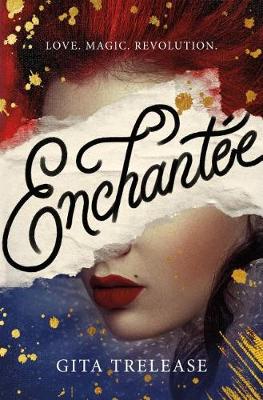Reviewed by Kelly on
In eighteenth century Paris, the streets whisper with discontent. The wealthy aristocratic community collecting taxation payments from the lower socioeconomic castes, Louis XVI and Marie Antoinette holding lavish parties for the affluent society. Camille Durbonne provides for her sister Sophie, recovering from the small pox virus that their parents succumbed, her brother Alain an alcoholic indebted to the dazzling lights of the royal casino.
Camille relies upon magie ordinaire and her ability to manipulate metal into currency, using sorrow as motivation for the transformation. Once celebrated for their abilities, magicians were revered by royalty and aristocrats to transform the Palace of Versailles into a glittering showcase of wealth, beauty and privilege. For a lowly printers daughter, Camille needs money for Sophie's medication and to keep the roof over their heads, brother Alain is unable to hold down a job and has sold anything of value within their crumbling, rented rooms. On a drunken rampage, Alain ransacks their home, assaults Camille and flees to Versailles with their overdue rent money.
Camille is a resilient young woman, using whatever means are at her disposal to earn money to care for her younger sister Sophie. Sophie is recovering from small pox, a disease which had taken both their parents lives and left the siblings for fend for themselves. And one another. While Camille and Sophie have been a means of support for one another, Alain begun gambling, seduced by the bright lights of Versailles and the careless life of an aristocrat.
Alain is an abusive character. He cares little for the welfare of his sisters, rather his own lifestyle of drinking and gambling which has lead him debt with dangerous creditors. Not only does he attempt to manipulate Camille but also threatens to sell Camille and Sophie with the implication of selling their bodies to clear his debts. Sophie is awestruck by this lavish life Alain leads and idolises her brother, Alain filling her head with false promises of Sophie meeting a wealthy aristocrat and marrying. Sophie is frustrating. Although incredibly naive at only fifteen years of age, she's only beginning to realise the toll that magic takes on Camille and begins working for a local milliner creating hats for the wealthy women of Paris. Unfortunately it still isn't enough money to survive.
Using her mother's glamoire gown and the last of their savings, Camille uses magic to manipulate her appearance to join the aristocrats at Versailles, where she's taken into the fold as the young widow Baroness de la Fontaine. For Camille, it's impossible not to lose her sense of identity within the dazzling atmosphere of Versailles and the privileged aristocrat lifestyle. Although Camille is seduced by her new lifestyle, she returns home with her winnings each day to provide for sister Sophie.
Sophie's loyalties seem to lie with Alain, her brother convincing the fifteen year old that she will one day become an aristocrat with influence, marrying a wealthy man and living a life of affluence. She becomes increasingly jealous of Camille, even as magie ordinaire slowly begins to destroy her sister. I found Sophie incredibly self centred and it's not a term I use lightly. Understanding that she is only fifteen years of age and recovering from a life threatening illness, she showed such little compassion for Camille except for wanting her sister to pursue relationships for societal gain.
The subtle romance was lovely. Meeting in the most unconventional manner, the aeronautic Lazare is dashing, charming and oh so chivalrous. His wonderment at Camille is absolutely delightful and he cares not for her societal standing. Leading her double life, Camille meets the wealthy, mysterious Seguin, an acquaintance of her new friends. Seguin is incredibly forward with his intentions, he likes Camille as her alternative ego but Camille also suspects he is aware there is more to her than the wealthy, lonely widow she portrays.
It was incredibly atmospheric. I was lured into the world of Versailles and the the lavish romanticism of the wealthy aristocrats. Gita Trelease has sprinkled words and phrases in French throughout the prose, creating such a lovely narrative and authenticity. An inclusion I really enjoyed.
My only complain is of the pacing. It's incredibly slow to begin. We follow Camille throughout the streets of Paris as she collects scrap metal to transform into coins and gambling to create a better life for her and Sophie. There was so much emphasis on the gambling and Camille stumbling home each night from exhaustion that there was little left for romance or developing Sophie's character.
Overall, it was slow but incredibly lovely. I expected more from the brewing revolution subplot rather than glittering casinos but really enjoyed it despite the slow beginning. Fans of lavish historical romances will love this one and looking forward to the next installment.
Reading updates
- Started reading
- 20 February, 2019: Finished reading
- 20 February, 2019: Reviewed
